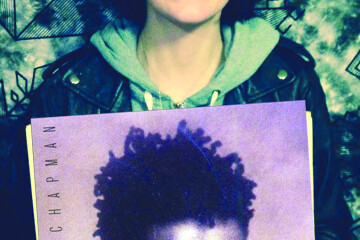Franken-Biafra’s Subversive Monster
Look What the Bird Haacked Up
I truly enjoy being cynical. I’m being completely honest. I love it. I also like to complain. About everything. However, my current standing as a young white female with a semi-respectable appearance has allotted me certain social privileges, such as: not being power hosed against concrete or euthanized for being stray without proper vaccination. Regardless, I still have quite a bone to pick with authoritarian power structures, whether it be police or dogmatic social rule. Although sometimes it seems immature to be constantly discontented with society around me, a few bands have successfully instilled in me some serious critical thinking skills (not obtained through public school or traditional ethics). Quite a few musicians in this cultural cesspool have had plenty of reasons to be upset. The bands that shaped my mental landscape were mostly abrasive, wry, and noisy. So of course Punk Rock plays a part in this, and I don’t believe it gets credit for a certain amount of rebellious intellect.
Thirty years ago Ronald Reagan was president. The parents of conservative America were trudging through the final years of the Cold War, finding solace in a crassly commercialized revival of fundamentalist Christianity. The kids of these mothers and fathers were trapped in the post-industrial waste left over. The public was safer than ever, distracted by advertisements on television and sanitized pop music. Compliance was consumption. Thankfully, a sardonic counter-culture was broiling under the surface of MTV music videos, with twice the intensity than the pacifistic Anti-Vietnam students of the 1960s. As you might guess, conservative politics and squeaky clean values do not belong in Rock Music. Especially not in Punk. The Ray Gun Administration spawned a generation of angry, frustrated young artists caught in a web of white suburbia and a pre-digital, existential dread. People were pissed, and this was the time for alternative music in America to really thrive like an angry bacteria. Bands like black Flag, Minor Threat, and Bad Brains annihilated the youth consciousness, warning the masses to either wake up and smell the cultural waste, or to waste away themselves. The music was loud and angry. It promoted a lifestyle contradictory to consumerism and intellectual mediocrity, but proved not nearly as nihilistic as the public thought. Many hardcore punk bands promoted abstaining from drugs and alcohol, and all of them revolted against television and American media. The bands mocked and taunted conservatives, with album covers splayed with caricatures of the Republican party, or groups named “Jerry’s Kids” and “Reagan Youth”. These musicians definitely had a sense of humour.
Indisputably, the godfather of American Punk has to be Jello Biafra, lyrical genius behind the Dead Kennedys. His sardonic lyrics were hilarious and thought provoking, his voice was loud and cavernous, and his stage presence proved rather intense. DK was the first band of the US hardcore circuit whose popularity spilled over into the UK, motherland of punk. The San Francisco outfit formed in 1979, making records and questioning American morals until 1987. When I was sixteen years old and in the beginning stages of developing my own views and sense of self (this also included getting legally divorced from my parents), I guess it’s fair to say that I felt a little bit discontent with those around me, and quite frankly culture itself. Finding Frankenchrist brought me solace and wisdom about our society in Jello’s own words. Their third studio album released in 1985, the Frankenchrist masterpiece is arguably the most impressive of the DK discography, second only to Bedtime For Democracy. The title is a reflection on the skewed definition of post-war Christianity to fit the world-police power of US political ethics. The music itself goes from 60s surf guitar riffs to psych breakdowns and minimal, industrial brilliance (we’ve all heard “At My Job”, right?). The album literally mocks and deconstructs virtually every trait of American Culture, from wage slavery to suicide to MTV. The album is not all satire, though. “Stars and Stripes of Corruption” throws some serious themes down about (as you might guess) corruption of our government. There’s nothing funny or rudimentary about the songwriter. Jello switches off his cartoonish vocals for his real voice in order to translate some serious content to the punk scene. He compares our society to a giant slave plantation whose end goal is commercial success and no rights for the middle class.
“No wonder others hate us,
And the Hitlers we handpick to bleed
their people dry
for our evil empire
The drug we’re fed
To make us like it
Is God and country with a band.”
It was their most controversial attack on capitalism, and it landed them some serious targeting from Tipper Gore and the absurd PRMC, a lobbyist campaign of senator wives whose greatest scapegoat for broken families was obviously free speech. They fought for increased censorship of rock music, leading to the legendary trial where Frank Zappa, Biafra, and John Denver spoke out against this bourgeois, first world disaster.
If you’re pretty conservative and already have distaste for anything slightly subversive, you will absolutely hate this album and The Dead Kennedys. There is nothing I can do for you. I won’t even bother trying. But for others who appreciate radical art and its political context, download Frankenchrist and listen to it whilst people watching or walking to work. You will most likely discover the intrinsic value of the album. Jello Biafra is a mad genius, and it’s virtually impossible to explain how comforting it is to find a band who “gets it”. Instead of wallowing in their own self pity in regards to existing in post-nuclear-war times, they made intelligent and thought provoking music in protest. If only we could be so inclined to do the same thing.



